Find out about the current and previous recipients of the Bank of Canada Museum Award for Excellence in Teaching Economics.
2025 winners
The winners of this year’s award are Canadian educators who showed innovation, creativity and community involvement in teaching economic concepts.
The winners were determined by a jury comprised of Bank of Canada staff and experts from non-profit organizations and government agencies in the fields of economics and education. The jury chose the winners through an impartial selection process that evaluates each submission anonymously, focusing solely on merit.
Middle school recipient: Angela Larocque
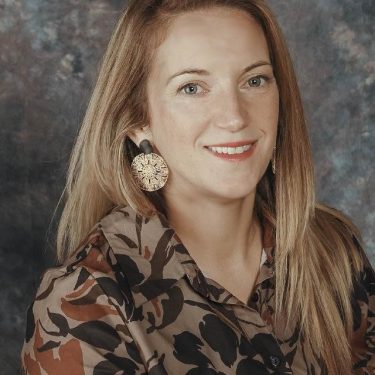
Angela Larocque
Teacher at Forest Hills School in St. John, New Brunswick
Angela Larocque is a passionate advocate for math and financial literacy. She has ignited a meaningful shift in her school and wider community through immersive financial literacy initiatives. This includes an annual entrepreneurship Idea Market and Money Matters, a community financial literacy night. Money Matters brings together local businesses, banks, and financial experts. This creates opportunities for open, judgment-free conversations about money between families and financial institutions. Angela builds bridges between the classroom and the wider community, making economics accessible, relevant, and inspiring.
Angela’s impact stretches far past the school walls. She mentors students through real-world projects, guiding them from bold ideas to actionable plans that impact their community and foster entrepreneurship.
The judges praised Angela’s commitment to practical, community-centered education that has led to the creation of original teaching materials and resources that are now being shared across the province. Angela’s work equips students with the tools to be financially capable, socially responsible, and confident contributors to society.
High school recipient: Nicole Feisst
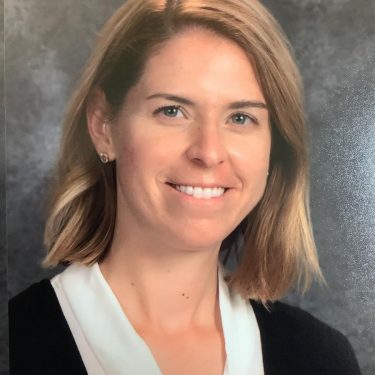
Nicole Feisst
Teacher at École Clément-Cormier in Bouctouche, New Brunswick
Nicole Feisst is an innovative educator and school coordinator who prepares her students for life beyond the classroom. Nicole and the Clément-Cormier career-life team designed a dynamic financial literacy simulation activity for grades 11 and 12 called “La vraie vie,” a program that helps students on the cusp of adulthood to get a grasp of real-life money management in an engaging way.
Highly comprehensive, the program begins with a questionnaire that determines the students’ career, salary expectations and education debt load. From there, they visit a series of kiosks set up in the gymnasium that determines such life expenses as taxes, housing, and transportation. A wheel of fortune throws unexpected life events their way, further complicating the navigation of their economic lives. What makes “La vraie vie” stand out is its realism and local relevance. Community professionals and business representatives take part, offering practical advice and lived experience.
The judges were especially impressed by Nicole’s creativity and commitment to student success. Her program doesn’t just teach financial literacy—it cultivates confidence, critical thinking, and a sense of personal responsibility. She has built something truly lasting and impactful within her school community.
2024 winners
The two winners of this year’s award are Canadian educators who showed innovation and creativity in teaching economic concepts.
The winners were determined by a jury comprised of Bank of Canada staff and experts from non-profit organizations and government agencies in the fields of economics and education. The jury chose the winners through an impartial selection process that evaluates each submission anonymously, focusing solely on merit.
Middle school recipient: Philippe Bélanger-Leroux
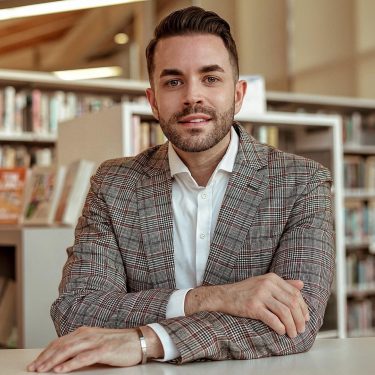
Philippe Bélanger-Leroux
Teacher at École secondaire Toronto Ouest in Toronto, Ontario
Philippe Bélanger-Leroux piqued his students’ interest in economics through literature. He assigned them to read the novel C'est ici que tout a commencé! by Franco-Ontarian author Liliane L. Gratton. Among the issues the book tackles is the gender wage gap—a social inequality that has real economic consequences.
To make his students more aware of this inequity, Philippe organized a career fair in his classroom. Students used gender statistics on average wages to calculate the hourly salary for a chosen job—both in Canada and abroad. Students compared the results and discussed the causes and consequences of the resulting wage gap.
Philippe’s students gained a greater awareness and understanding of an economic issue that persists in Canada today. They also developed great critical thinking skills.
The judges felt this project was not only a creative way to incorporate economic thinking into a language class but it also addressed a highly relevant social issue.
High school recipient: Kimberly Orr
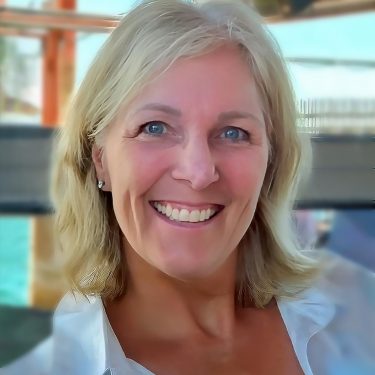
Kimberly Orr
Teacher at St. George’s School in Vancouver, British Columbia
Each year, Kimberly Orr holds a “Dragons’ Lair” business plan competition similar to the CBC television program Dragons’ Den. Popular throughout the school and open to all students, the competition is part of her grade 10 entrepreneurship course, where she introduces the fundamentals of economics and business to her students.
Contestants identify market needs, conduct research and identify solutions to address those needs. As the students progress through the competition, Orr mentors them with feedback and guidance at every step. Students present their business plans to a panel of local entrepreneurs at the end of “Dragons’ Lair.”
Orr’s enthusiastic approach to teaching economics combines theoretical knowledge with practical applications, equipping students to take an interest in the world of commerce—and maybe future careers in business.
The judges saw inspiration for other teachers in Orr’s competition. An economics project that generates interest across all grades of a high school can only deepen students’ understanding of key economic principles.
2023 winners
Both winners are Canadian teachers in middle and high school who showed innovation and creativity in teaching economic concepts.
The winners were determined by a judging panel comprised of members of non-profit organizations, government agencies and the Bank of Canada.
Middle school recipient: Andre Boutin Maloney

Andre Boutin Maloney
Teacher at Bert Fox Community High School in Fort Qu’Appelle, Saskatchewan
Bringing history to life is a goal of many teachers, but to teach applicable economic concepts at the same time is a win-win situation for any educator.
Andre Boutin Maloney taught his financial literacy class to be teachers themselves. His students developed an interactive trading post simulation that combined Indigenous history and ingenuity with many economic principles.
Students learned about Canada’s fur trade, the roles of trapper and trader, economic concepts such as free markets and supply and demand, and social issues related to perceived value and industrialization. They then created a game to exchange beaver pelt tokens for cards representing trade items. But, of course, there was a catch. Each card came with conditions that could help or hinder a trapper’s efficiency, allowing players to better understand the economic and social challenges fur trappers faced in pre-Confederation Canada.
Andre’s students made sure the game was accessible to younger learners. Then the middle school students ran it with those learners at Fort Qu’Appelle’s Treaty 4 Gathering, creating opportunities for peer learning and strong community engagement.
High school recipient: Kim Dudek
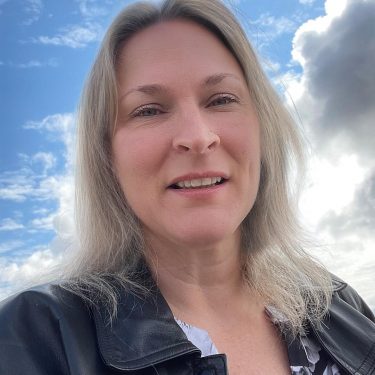
Kim Dudek
Teacher at Murdoch MacKay Collegiate in Winnipeg, Manitoba
Can you teach economics to kids while simultaneously benefitting the community? Seems like a big challenge, but it turns out you can do just that.
Kim works with an Indigenous Academic Achievement class. Their classroom name is Mino-pimatisiwin, or "the good path," a space where learning centres on sharing and generosity. Her winning project began as a student-led initiative to raise money for a women’s shelter—and do it during the economically challenging holiday season. So, they started a trading post.
Using all of their creative skills, the students made crafts and cultural gifts to sell in their post. They faced head-on such issues as business contracts, sourcing supplies, labour, advertising, multiple payment methods and currencies. They also learned key economic lessons about free and mixed market economies.
But above all, Kim’s students experienced Indigenous understandings of shared wealth and community assistance while learning to become entrepreneurs themselves.
2022 winners
Middle years recipient: Alysha Coates
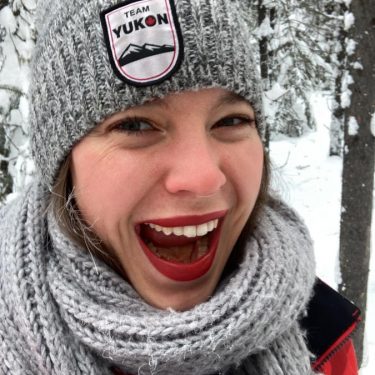
Alysha Coates
Elementary school teacher at Elijah Smith Elementary School (Whitehorse, Yukon)
When entrepreneurial spirit and economics combine, great things can happen. Especially if you’re selling something as delicious as hot chocolate.
Alysha’s class designed their own hot chocolate business—brand, logo, slogan and all. The students began by comparing prices for ingredients and then purchased their supplies with a small business loan of $20. Planning and prototyping were followed by a weeklong sale to peers. Amid the fun, students learned about budgeting, price comparing, and compound interest.
Creating this entrepreneurial activity was a formative experience for the students. Alysha introduced many larger concepts within the activity. Students had conversations about income tax through their budgeting and learned about the role of branding and advertising through their own trial and error. Students used play money for their transactions which ensured an equal playing field for all. Alysha’s teaching demonstrated the incredible role real-life learning can play in introducing economic and financial literacy.
High school recipient: Chris Moon
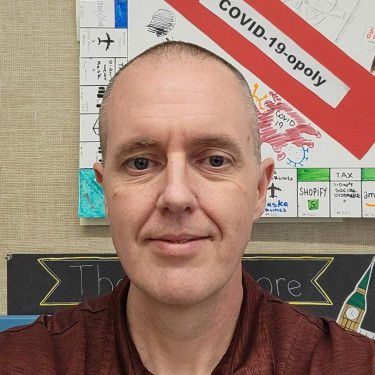
Chris Moon
High school teacher at Vancouver Technical Secondary (Vancouver, British Columbia)
How do you teach the complexity of the economic impacts of COVID-19 pandemic when it’s happening in front of your student’s eyes? Gamify it.
Chris’s students conducted background research and game development to create a COVID-themed board game “COVID-19-opoly.” This inquiry project involved students parsing out the news and reflecting the economic realities of the pandemic in a fun and informative way. Masking, lockdowns, subsidies and food delivery were all elements in the game.
Students explored urban markets, household budgets, social reform, the role of the Canadian Emergency Response Benefit (CERB) and impacts on international trade and the supply chain. Throughout the learning Chris incorporated teaching on economic thinkers including Smith, Ricardo, Marx, Malthus, Keynes and Hayek. Given the challenges of the global pandemic, Chris brought real-world experiences into the classroom and helped his students develop resiliency and imagine a better future.
